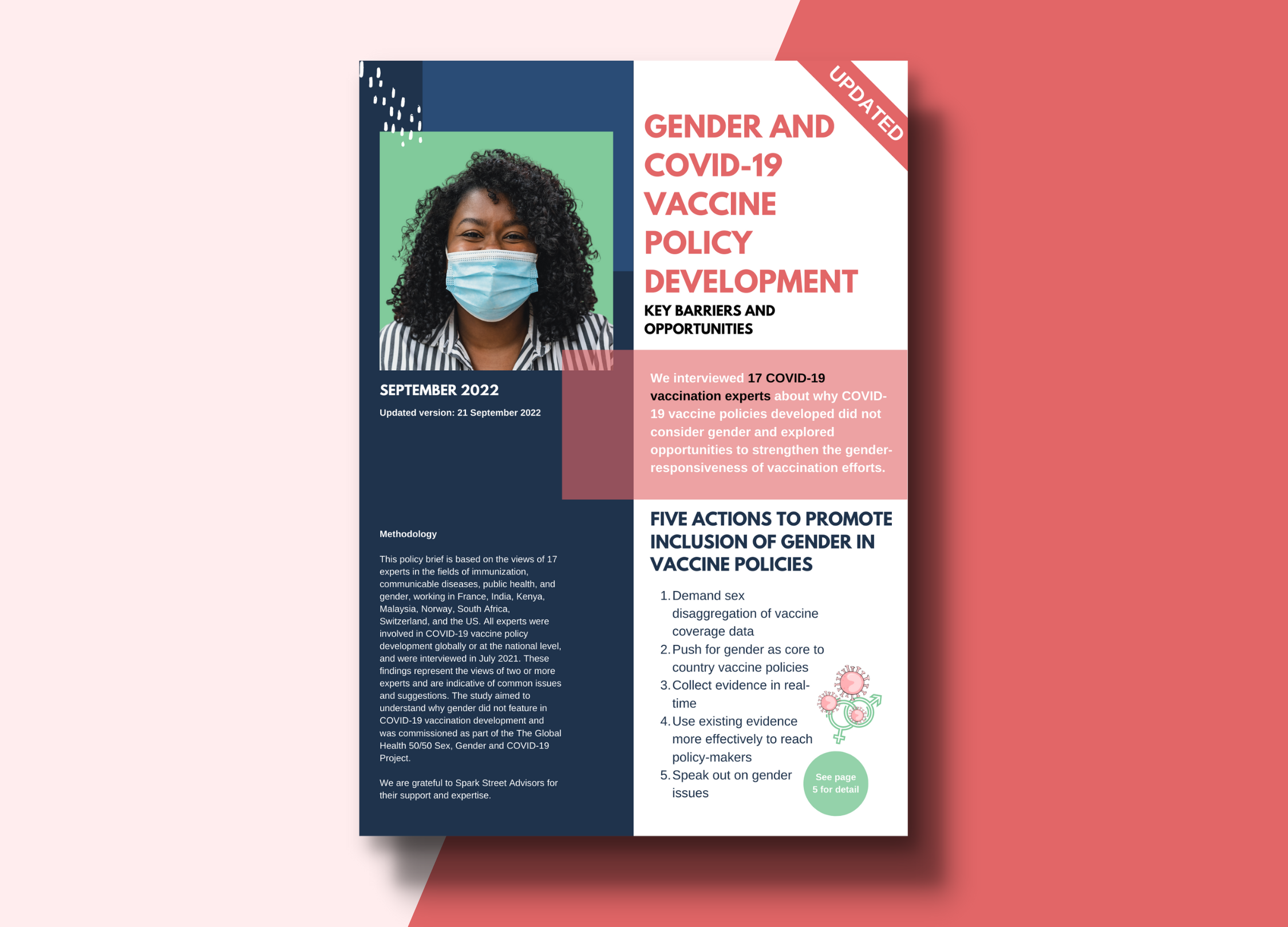Download the Gender and COVID-19 Vaccine Policy Development brief here.
COVID-19 vaccine policies set in the first 18 months of the pandemic initially ignored gender norms, roles, and relations as drivers of health outcomes. A new report, Gender and COVID-19 Vaccine Policy Development, provides a set of lessons from this process for including gender from the outset of the development of any vaccine policy and highlights the actions that can be taken to develop gender-inclusive vaccine policies into the future. Sex-disaggregated data is a key tool to enable vaccine policies informed by evidence as well as a mechanism ensuring that vaccine delivery is gender equitable.
“Gender-informed programming is key for health equity. And gender disaggregated data should be non-negotiable in reporting” says Nina Schwalbe, Principal of Spark Street Advisors, faculty member at Columbia University Mailman School of Public Health, and one of the co-authors of the report.
The report summarises the experiences and reflections of 17 international and national COVID-19 vaccine policy experts interviewed in July 2021. Based on the interviews, it provides five recommendations to help improve existing COVID-19 vaccine policies as well shape the development of new vaccine policies, including for other diseases: i) collect appropriate data and evidence; ii) develop measurable goals; iii) incentivise countries to provide sex-diaggregated data as part of routine reporting requirements; iv) support inclusive policy making; and v) avoid separate policies – incorporate gender guidance into existing policies.
“We need to ensure that policymakers are in possession of sex-disaggregated data and evidence to inform gender-inclusive vaccine policies” says Ravi Verma, Asia Regional Director, International Center for Research on Women and partner on the Global Health 50/50 Sex, Gender and COVID-19 Project, “Without the right data and evidence we cannot target all populations and we won’t know if the vaccine is being delivered to all.”
The lessons apply as much to current COVID-19 policies as they do for future vaccine policy for other diseases.
Commenting on these findings, Global Health 50/50 co-directors Professor Sarah Hawkes and Professor Kent Buse said “Considering gender should not be an afterthought but a central component of addressing health inequities. Part of the solution is ensuring women’s leadership and gender expertise in the room. Moving forward, women’s leadership should be fundamental – not only to pandemic preparedness but to all health policies and programmes.”
The interviewed experts urged stakeholders, including civil society, to speak out on gender issues. Despite the fact that COVID-19 has aggravated existing inequities and has had severe gendered impacts, the pandemic has provided important insights into the inclusion of gender for what lies ahead.
“The COVID-19 pandemic has had profoundly different impacts on women and men” said the Rt. Hon Helen, Clark, Former Prime Minister of New Zealand, Former Administrator of the United Nations Development Programme (UNDP), and co-chair of the Independent Panel for Pandemic Preparedness and Response ”As this new report from Global Health 50/50 makes clear, it is crucial that our responses to this and future pandemics are gender equitable. We do not have the luxury to be gender-blind in the future.”
Suggested citation: Global Health 50/50, African Population and Health Research Center, International Center for Research on Women, and Spark Street Advisors (2022) Gender and COVID-19 Vaccine Policy Development, Cambridge, UK. https://doi.org/10.56649/NVBZ6565
Last updated: 21 September 2022.




